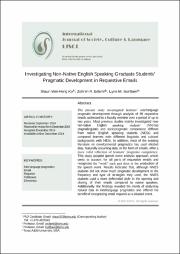| dc.contributor.author | Wei-Hong Ko, Shuan | en_US |
| dc.contributor.author | Eslami, Zohreh | en_US |
| dc.contributor.author | Burlbaw, Lynn | en_US |
| dc.date.accessioned | 1399-07-08T20:00:00Z | fa_IR |
| dc.date.accessioned | 2020-09-29T20:00:00Z | |
| dc.date.available | 1399-07-08T20:00:00Z | fa_IR |
| dc.date.available | 2020-09-29T20:00:00Z | |
| dc.date.issued | 2015-03-01 | en_US |
| dc.date.issued | 1393-12-10 | fa_IR |
| dc.date.submitted | 2014-09-25 | en_US |
| dc.date.submitted | 1393-07-03 | fa_IR |
| dc.identifier.citation | Wei-Hong Ko, Shuan, Eslami, Zohreh, Burlbaw, Lynn. (2015). Investigating Non-Native English Speaking Graduate Students’ Pragmatic Development in Requestive Emails. International Journal of Society, Culture & Language, 3(1), 1-15. | en_US |
| dc.identifier.issn | 2329-2210 | |
| dc.identifier.uri | http://www.ijscl.net/article_10916.html | |
| dc.identifier.uri | https://iranjournals.nlai.ir/handle/123456789/78983 | |
| dc.description.abstract | The present study investigated learners' interlanguage pragmatic development through analysis of 99 requestive emails addressed to a faculty member over a period of up to two years. Most previous studies mainly investigated how non-native English speaking students' (NNESs) pragmalinguistic and sociopragmatic competence differed from native English speaking students (NESs) and compared learners with different linguistic and cultural backgrounds with NESs. In addition, most of the existing literature on developmental pragmatics has used elicited data. Naturally occurring data, in the form of emails, offer a more valid reflection of learners' pragmatic competence. This study adopted speech event analysis approach, which seeks to account for all parts of requestive emails and recognizes the “work" each part does in the production of the speech event. Results indicated that, although NNES students did not show much pragmatic development in the frequency and type of strategies they used, the NNES students used a more deferential style in the opening and closing of their emails compared to native speakers. Additionally, the findings revealed the merits of analyzing natural data in interlanguage pragmatics and offered the benefit of recognizing email requests as a situated event. | en_US |
| dc.format.extent | 658 | |
| dc.format.mimetype | application/pdf | |
| dc.language | English | |
| dc.language.iso | en_US | |
| dc.publisher | Katibeh-ILCRG | en_US |
| dc.relation.ispartof | International Journal of Society, Culture & Language | en_US |
| dc.subject | Interlanguage pragmatics | en_US |
| dc.subject | Email | en_US |
| dc.subject | Requests | en_US |
| dc.subject | Politeness | en_US |
| dc.subject | Directness | en_US |
| dc.title | Investigating Non-Native English Speaking Graduate Students’ Pragmatic Development in Requestive Emails | en_US |
| dc.type | Text | en_US |
| dc.type | Research Paper | en_US |
| dc.contributor.department | Texas A&M University, USA | en_US |
| dc.contributor.department | Texas A&M University, USA | en_US |
| dc.contributor.department | Texas A&M University, USA | en_US |
| dc.citation.volume | 3 | |
| dc.citation.issue | 1 | |
| dc.citation.spage | 1 | |
| dc.citation.epage | 15 | |





